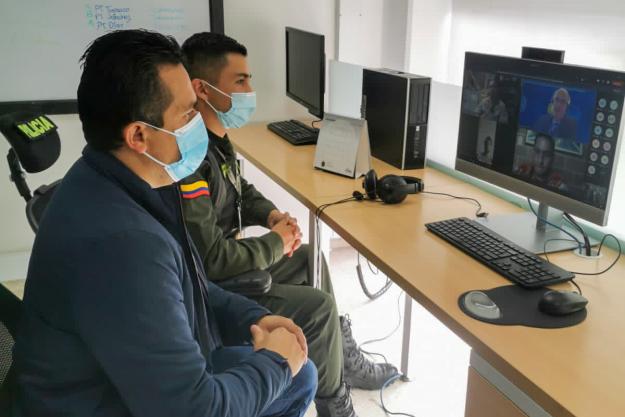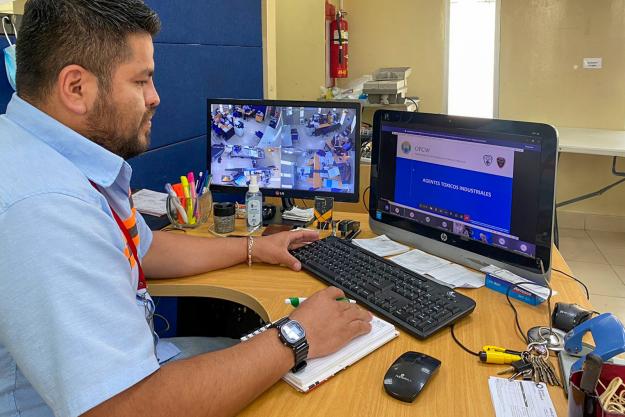Emergency first responders from Latin America and the Caribbean (GRULAC) reinforced their knowledge of detection, sampling, and identification of chemical warfare agents and toxic industrial chemicals during a live online training conducted in Spanish from 11 to 15 October. The event was conducted by the Organisation for the Prohibition of Chemical Weapons (OPCW) in partnership with the Colombian National Police and the National Directorate of Colombian Firefighters and responds to continuing demand from GRULAC Member States for chemical emergency skills training of this type.
As training and development lead for firefighters from the National Fire Department of Colombia, Mr Mauricio Delgado Perdomo, expressed: "For Colombia, it is an honour to contribute to the strengthening of capacities in the region. The National Directorate of Colombian Firefighters has supported this training with our highly qualified and experienced instructors."
A specialist in explosives from the National Police of Colombia, Chief Intendant Mr Oscar Benavidez Torres, remarked: "Instructors from the National Police and the National Fire Department of Colombia are committed to helping OPCW train First Responders from Latin America and the Caribbean in response, detection, and identification of chemical weapons."

Senior Programme Officer from the OPCW's Assistance and Protection Branch stated: "Detection and sampling techniques are essential in operations involving chemical warfare agents. That is why the preparation and development of skills in this field is of vital importance."
The course provided theoretical knowledge on the detection, identification and sampling techniques required for obtaining and preserving evidence during incidents involving chemical warfare agents and toxic industrial chemicals. The course also covered the provisions of the Chemical Weapons Convention, the work of the OPCW, and the activities of its Assistance and Protection Branch.
The participants included 56 military and civilian professionals from a range of emergency response backgrounds, including civil defence, hazmat equipped firefighters, and CBRN (chemical, biological, radiological and nuclear defense) military units, and represented the following 11 OPCW Member States: Argentina, Brazil, Chile, Costa Rica, Ecuador, El Salvador, Guatemala, Honduras, Mexico, Peru, and Uruguay.

Background
This was the eleventh online course for OPCW Member States in Latin America and the Caribbean held since the beginning of the Covid-19 pandemic, organised to support the full and effective implementation of Article X (Assistance and Protection against Chemical Weapons) of the Chemical Weapons Convention.
As the implementing body for the Chemical Weapons Convention, the OPCW, with its 193 Member States, oversees the global endeavour to permanently eliminate chemical weapons. Since the Convention's entry into force in 1997, it is the most successful disarmament treaty eliminating an entire class of weapons of mass destruction.
Over 98% of all declared chemical weapon stockpiles have been destroyed under OPCW verification. For its extensive efforts in eliminating chemical weapons, the OPCW received the 2013 Nobel Peace Prize.






